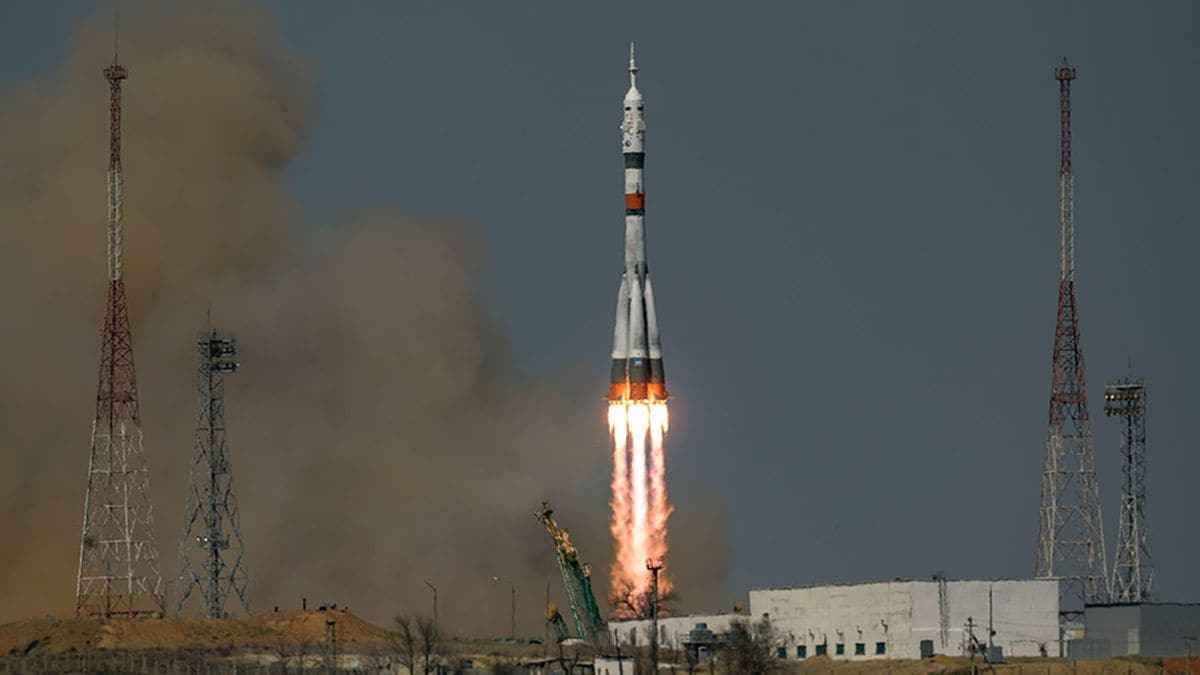A three-man crew docked at the international Space Station Friday after a flight honouring the 60th anniversary of Soviet cosmonaut Yuri Gagarin becoming the first person in space.
A Soyuz capsule carrying Roscosmos cosmonauts Oleg Novitsky and Pyotr Dubrov and NASA astronaut Mark Vande Hei docked at 1105 GMT (4:35pm IST), footage broadcasted by NASA TV showed.
“There is contact!” Russia’s space agency Roscosmos wrote on Twitter.
“Hey, Expedition 64 – set the dinner table… Can’t wait to join you on @Space_Station in a few hours!” Vande Hei tweeted to the crew on board the ISS hours before blast-off.
The launch came just ahead of Monday’s anniversary of Gagarin’s historic flight on April 12, 1961.
Reminders of his achievement were everywhere at the Russia-operated Baikonur cosmodrome in Kazakhstan as Novitsky, Dubrov and Vande Hei prepared for their half-year mission aboard the orbital lab.
The Soyuz MS-18 spacecraft that the trio took off in has been named after the legendary cosmonaut and Gagarin’s portrait has been added to its exterior.
Gagarin also came up more than once in the traditional pre-flight press conference on Thursday, where the crew was asked how they planned to mark the anniversary once in space.
“We’ll celebrate it together,” said 43-year-old Dubrov, who is flying to space for the first time. “And we’ll work hard!”
Friday’s blast-off was from a different launchpad than the one used for Gagarin’s one and only mission, which saw him spend 108 minutes in orbit.
Tough times
Last used in 2019, the Gagarin launchpad is undergoing upgrades in preparation for a new generation of Soyuz rockets and expected to return to action in 2023.
Gagarin’s mission was a propaganda coup for the Soviet Union and a huge win in the space race with the West, which became one of the Cold War’s most exciting subplots.
But the anniversary comes at a difficult time for Russia’s space industry, which has suffered a number of setbacks recently, from industry corruption scandals to an aborted take-off scuppering a manned mission in 2018.
Perhaps most importantly, Roscosmos and Baikonur last year lost their monopoly over manned ISS launches, as reusable rockets from Elon Musk’s Space X delivered NASA astronauts to the station from American soil.
The emergence of commercial competitors has left Roscosmos with a financial headache – NASA has paid the company tens of millions of dollars per seat for astronauts sent to the ISS.
Russian space officials still talk up new ventures, including bringing back samples from Venus and creating a rocket capable of making 100 round trips to space.
Yet the space budget has fallen year by year as President Vladimir Putin prioritises increased military spending.
Crowded space station
Space has proven a rare area of cooperation between Russia and the West amid rising geopolitical tensions.
But the ISS project, which began in 2000, is expected to be retired before the end of this decade.
Despite talk of NASA and Roscosmos heading in different directions as the space station winds down, crews have stressed the importance of good relations for continued progress.
“When we first started we were competing with each other and that was one of the reasons we were so successful at the beginning of human space flight,” said Vande Hei, who poked fun at the haircut he gave himself during quarantine ahead of his second mission aboard the ISS.
“As time went on we realised we could achieve a bit more working together… I hope that will continue into the future.”
The ISS, which is typically home to six people at a time, is set to be fairly crowded for the next week, with seven astronauts and cosmonauts on board before the trio arrived.
NASA’s Kate Rubins and Russian cosmonauts Sergei Ryzhikov, and Sergei Kud-Sverchkov are set to return from the space station on April 17.
What is the best phone under Rs. 15,000 in India right now? We discussed this on Orbital, the Gadgets 360 podcast. Later (starting at 27:54), we speak to OK Computer creators Neil Pagedar and Pooja Shetty. Orbital is available on Apple Podcasts, Google Podcasts, Spotify, and wherever you get your podcasts.
